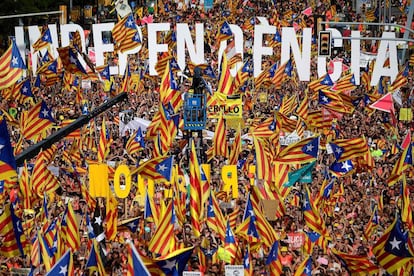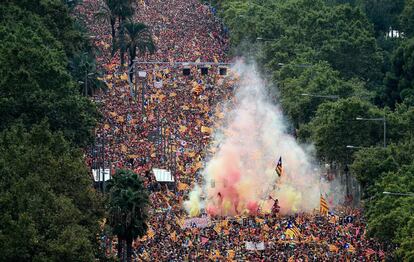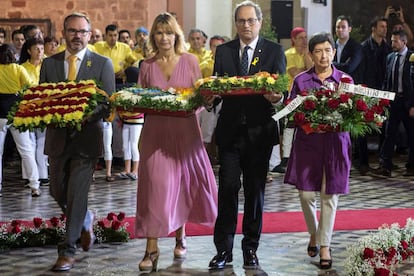On Catalonia Day, separatists march for “freedom” and “independence”
The pro-independence movement has vowed to turn the Diada into a tribute to the jailed and exiled leaders of the secessionist attempt

Catalonia is today observing its Diada, or National Day, after a year of momentous events that included an outlawed referendum, a failed unilateral declaration of independence and more than seven months of direct rule by the central government in Madrid.
Shortly after 5pm, a flare went off signaling the beginning of a pro-independence march along Barcelona’s Diagonal avenue. Following guidelines issued by organizers, the crowd remained silent until this signal, then produced a “sound wave” meant to represent the “strength of the people” taking down a metaphorical wall towards independence.

The pro-independence movement has vowed to turn the Diada, held every September 11, into a tribute to the leaders of the drive to secede from Spain. Some of these leaders fled the country to avoid arrest on rebellion charges, including former regional premier Carles Puigdemont and several government aides. Others have been held in pre-trial detention since late October, and sympathizers describe them as “political prisoners.”
Barcelona Mayor Ada Colau has shown support for the release of these separatist leaders, but said she would not attend the march because its organizers are too closely associated with the idea of unilateral secession. “I disagree politically with the separatists on many fronts, but I defend the rights and freedoms of our adversaries,” she said, speaking at a ceremony during which flowers were laid at the feet of monuments to historical leaders who defended the city during the War of Spanish Succession in 1714.

Unionist parties have complained that the slogan selected for this year’s march, “Fem la República Catalana” (We make the Catalan Republic), leaves out half the population of Catalonia. “Today we want to lend a voice to the millions of Catalans who will not go out on the street today, who cannot feel a part of the acts by this government,” said Inés Arrimadas, the regional leader of Ciudadanos, which defends unity with Spain. “We ask them not to forget the millions of Catalans who deserve as much respect as those who will march, and who are just as democratic. We want to underscore that social harmony is better than social fracture.”
Regional premier Quim Torra, a hardline separatist who was handpicked by Puigdemont and sworn in on June 2, ending over seven months of direct rule by Madrid, on Tuesday drew historical parallels between the past and present of Catalonia. In his institutional address, Torra called on all Catalans to “resist and advance” against “injustices, fear, prison and exile.”
Foreign press
At a news conference with foreign correspondents, Catalan premier Quim Torra said he is not considering a unilateral decision to release the separatist leaders who are currently awaiting trial for rebellion, sedition and misuse of public funds, and who were transferred to Catalan penitentiaries soon after Pedro Sánchez became the new prime minister of Spain on the back of a successful no-confidence motion against previous PM Mariano Rajoy. “I don’t have that option,” said Torra, who defended himself against claims that he has done little in his first 100 days in power.
The pro-independence association Catalan National Assembly, which is organizing the march, said that 460,000 people have registered, that 1,500 buses filled with supporters are coming into Barcelona, and that 270,000 t-shirts have been sold. The entire regional government has said it will participate in the street demonstration.
Attendance figures for last year vary wildly depending on the source. The municipal police, the Guardia Urbana, reported one million participants in the 2017 Diada march, while the central government’s delegate to the region spoke of 350,000.
Elsa Artadi, the Catalan government’s spokesperson, has asked Spanish Prime Minister Pedro Sánchez for “a political solution to a political challenge,” and said she expected “at least two million people” to march this afternoon, “determined to exercise their right to self-determination.”
At the last regional election of December 2017, separatist parties collectively obtained 47.5% of the vote, and a slim parliamentary majority of 70 seats in the 135-member house.
English version by Susana Urra.
Tu suscripción se está usando en otro dispositivo
¿Quieres añadir otro usuario a tu suscripción?
Si continúas leyendo en este dispositivo, no se podrá leer en el otro.
FlechaTu suscripción se está usando en otro dispositivo y solo puedes acceder a EL PAÍS desde un dispositivo a la vez.
Si quieres compartir tu cuenta, cambia tu suscripción a la modalidad Premium, así podrás añadir otro usuario. Cada uno accederá con su propia cuenta de email, lo que os permitirá personalizar vuestra experiencia en EL PAÍS.
¿Tienes una suscripción de empresa? Accede aquí para contratar más cuentas.
En el caso de no saber quién está usando tu cuenta, te recomendamos cambiar tu contraseña aquí.
Si decides continuar compartiendo tu cuenta, este mensaje se mostrará en tu dispositivo y en el de la otra persona que está usando tu cuenta de forma indefinida, afectando a tu experiencia de lectura. Puedes consultar aquí los términos y condiciones de la suscripción digital.








































